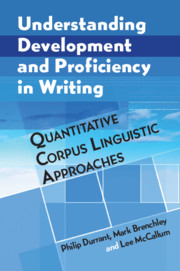Book contents
- Understanding Development and Proficiency in Writing
- Understanding Development and Proficiency in Writing
- Copyright page
- Contents
- Figures
- Tables
- Acknowledgements
- 1 Introduction
- 2 Theoretical and Methodological Foundations
- 3 Development in Syntax
- 4 Development in Vocabulary
- 5 Development in Formulaic Language
- 6 Development in Cohesion
- 7 Conclusions
- References
- Index
6 - Development in Cohesion
Published online by Cambridge University Press: 26 February 2021
- Understanding Development and Proficiency in Writing
- Understanding Development and Proficiency in Writing
- Copyright page
- Contents
- Figures
- Tables
- Acknowledgements
- 1 Introduction
- 2 Theoretical and Methodological Foundations
- 3 Development in Syntax
- 4 Development in Vocabulary
- 5 Development in Formulaic Language
- 6 Development in Cohesion
- 7 Conclusions
- References
- Index
Summary
This chapter reviews the quantitative corpus linguistic literature on development of cohesion in first- and second-language writing. It first provides a theoretical and methodological context for such work by discussing the two main frameworks within which cohesion has been researched. It then critically reviews an extensive body of literature to establish what substantive conclusions can be drawn and what might constitute productive foci for future research. Interest in cohesion as a correlate of development has been less intense than that seen for grammar, vocabulary, and formulaic language, and few consistent patterns have emerged. While there is some indication that a small number of measures are associated with development, evidence on these is too sparse for any confident conclusions to be drawn. Moreover, quantitative measures of cohesion appear to be highly contextually specific, depending crucially on the nature of the text and on the writer's estimation of their audience's topic knowledge.
Keywords
- Type
- Chapter
- Information
- Understanding Development and Proficiency in WritingQuantitative Corpus Linguistic Approaches, pp. 183 - 200Publisher: Cambridge University PressPrint publication year: 2021

